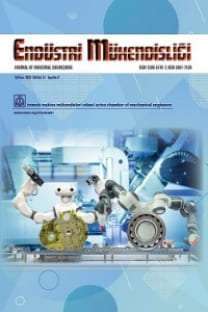Aksiyomlarla tasarım ilkelerine göre takım çalışması esaslı ofis hücrelerinin planlanması ve uygulanması
Ofis işlemleri, sistem performansı üzerinde önemli bir rol oynamaktadır. Bununla beraber günümüzün artan rekabet ortamında hemen hemen ihmal edilmiş durumdadır. Bu çalışmada, ofis işlemlerinin performansını arttırmak için, aksiyomlarla tasarım ilkelerini kullanan etkin bir ofis hücresi tasarım metodolojisi geliştirilmiştir. Metodolojide, hücrenin oluşturulması ve işletilmesi ile ilgili tüm aşamalar ayrıntılı bir şekilde açıklanmıştır. Ayrıca katma değeri olmayan faaliyetler nedeni ile sıkıntı çeken bir firmada, geliştirilen metodolojiye uygun hücreler tasarlanmış ve uygulamaya alınmıştır. Ek olarak uygulama sonucunda elde edilen kazançlar hakkında bilgi verilmiştir.
Office operations play a significant role to system performance. However they are almost neglected for developing competitive advantage. In this study, we develop a methodology for an efficient office cell design using axiomatic design principles in order to increase the performance of office operations. All the steps of the methodology for office cell design, which consists of both forming and operating a cell is explained in detail. Furthermore the real office cells implementation using the developed methodology in a loyalty-marketing group of companies, which suffers from non-value adding activities is described.
___
- 1-AKAO, Y., 1991, Hoshin Kanri, Policy Deployment for Successful TQM (Portland, Oregon, Productivity Press).
- 2-ALBANO, L.D. ve SUH,N.P, 1992, Axiomatic approach to structural design. Research in Engineering Design, 4,3,171-183.
- 3-BABIC, B., 1999, Axiomatic design of flexible manufacturing systems. International Journal of Production Research,37,5,1159-1173.
- 4-BAUDIN, M., 1996, Supporting JIT production with the best wage system. IIE Solutions, 28,2,30-35.
- 5-COCHRAN, D. S., ARINEZ, J. A., DUDA, W. D. ve LINCK,J., 2001/2002, A decomposition approach for manufacturing system design. Journal of Manufacturing Systems, 20,6,371-389.
- 6-GARRISON, R. H. ve NOREEN, E. W., 1994, Managerial Accounting, Concepts for Planning, Control, Decision Making.(Richard D. Irwin), seventh edition, chapter 5, pp.192-193.
- 7-HINES, P., SILVI, R. ve BARTOLINI, M., 2002, Lean Profit, Potential. (Lean Enterprise Research Center, UK), chapter 1.
- 8-HOFFMAN, J. R. ve ROGELBERG, S. G., 1998, A Guide to Team Incentive Systems. Team Performance Management, 4,1, 23-32.
- 9-HYER, N. ve WEMMERLOV, U., 2002a, Reorganizing the Factory, Competing Through Cellular Manufacturing, (Portland, Oregon, Productivity Press), chapter 18, pp. 573-617.
- 10-HYER, N. ve WEMMERLOV, U., 2002b, The Office That Lean Built, HE Solutions, 34,10,37-43.
- 11-KIM, S., J., SUH, N. P. ve KIM, S., 1991, Design of Software Systems Based on AD. Annals of CIRP, 40,165-170.
- 12-KULAK, O., DURMUŞOĞLU M.B., TÜFEKÇİ, S., 2004, A Complete Cellular Manufacturing System Design Methodology based on Axiomatic Design Principles, Computers & Industrial Engineering, Yayınlanacak
- 13-SUH, N.P., 1990, The Principles of Design. (New York:Oxford University Press).
- 14-SUH, N. P., 1995a, Designing-in of Quality Through Axiomatic Design. IEEE Transactions on Reliability, 44,2,256-264.
- 15-SUH, N. P., 1995b, Design and operation of large systems.Annals of CIRP, 14,3,203-213.
- 16-SUH, N. P., 1997, Design of systems, Annals of CIRP, 46,1,75-80.
- 17-SUH, N. P., COCHRAN, D. S. ve PAULO C. L, 1998, Manufacturing system design. CIRP Annals, 47,2,627-639.
- 18-SUH, N. P., 2001, Axiomatic Design: Advances and Applications, (New York: Oxford University Press).
- 19-SURI, R., 1998, Quick Response Manufacturing, (Portland,Oregon, Productivity Press), chapter 11, pp. 303-333.
- 20-SUZAKI, K., 1993, The New Shop Floor Management, Empowering People For Continuous Improvement, (The Free Press), chapter 10, pp. 284-290.
- 21-WALLACE, D.R. ve SUH, N. P., 1993, Information-based Design for Environmental Problem Solving, Annals of CIRP,42,1,175-180.
- 22-WISSEMA, H,, 1992, Unit Management II: Entrepreneur-ship and Cohesion in the Decentralized Firm, (The Financial Times/Pitman Management Series).
- ISSN: 1300-3410
- Yayın Aralığı: Yılda 3 Sayı
- Başlangıç: 1989
- Yayıncı: TMMOB MAKİNA MÜHENDİSLERİ ODASI
